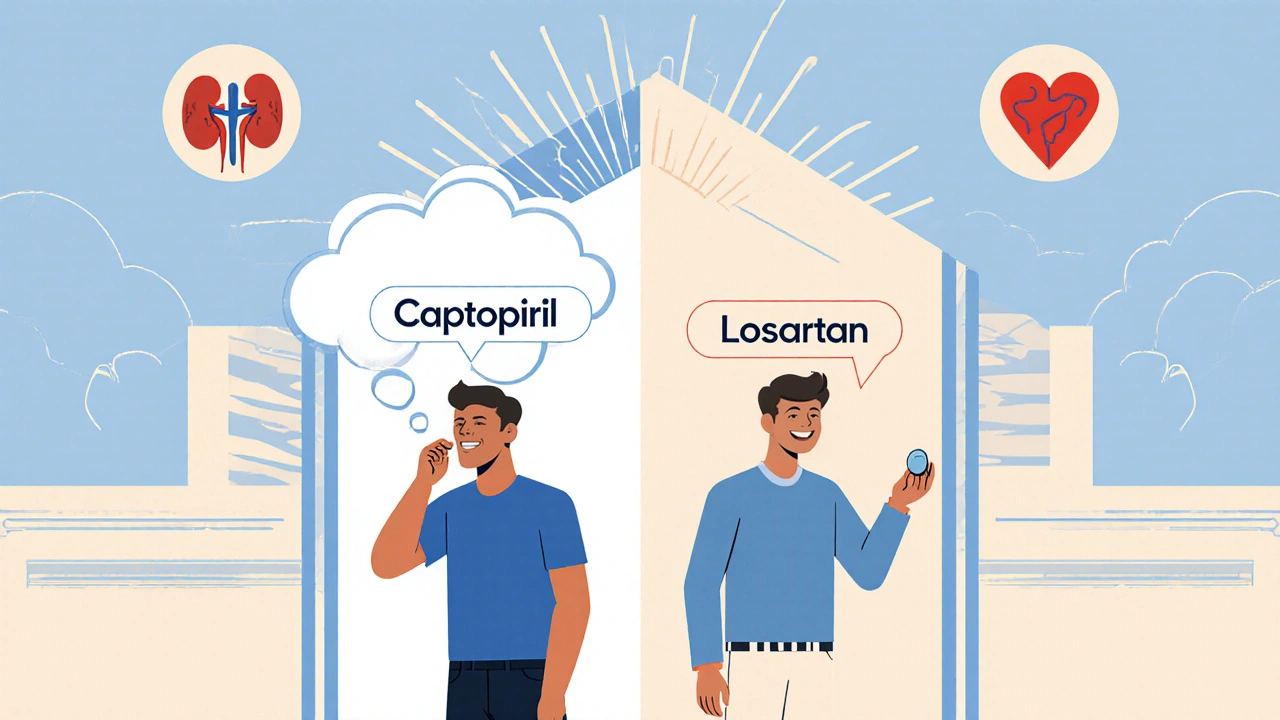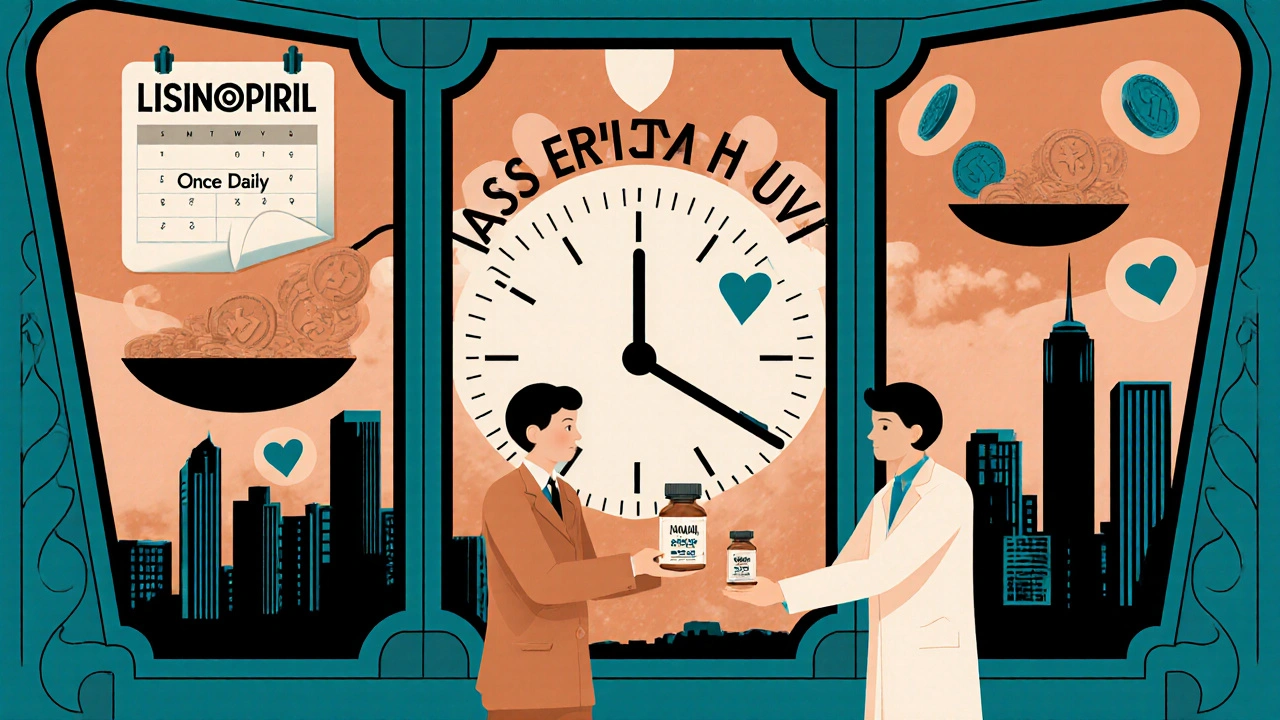Capoten (Captopril) vs. Alternatives: What Works Best for High Blood Pressure?
 Oct, 30 2025
Oct, 30 2025
Blood Pressure Medication Finder
Personalized Blood Pressure Medication Guide
This tool helps you find the most suitable blood pressure medication alternative based on your specific symptoms, medical conditions, and lifestyle.
Let's find the right medication for you
Answer a few simple questions to get personalized recommendations based on current medical evidence.
Do you experience dry cough from Captopril?
Do you have diabetes or kidney disease?
Are you Black?
What's your main concern?
Recommended Medication
Key benefits for your situation:
Important considerations:
If you’ve been prescribed Captopril (sold as Capoten), you’re not alone. Millions use it to manage high blood pressure and heart failure. But maybe you’re experiencing side effects-dry cough, dizziness, or a strange taste in your mouth-or your doctor is suggesting a switch. You’re wondering: what are the real alternatives, and which one actually works better for your body?
What is Captopril (Capoten) and how does it work?
Captopril is an ACE inhibitor, a type of medication that blocks the enzyme responsible for narrowing blood vessels. By relaxing those vessels, it lowers blood pressure and reduces the heart’s workload. It was one of the first ACE inhibitors approved in the 1980s and remains in use today, especially in places with limited access to newer drugs.
It’s commonly used for:
- High blood pressure (hypertension)
- Heart failure after a heart attack
- Diabetic kidney disease in type 1 diabetes
- Some cases of chronic kidney disease
But it’s not perfect. About 10-20% of people on Captopril develop a persistent dry cough. Others report fatigue, low blood pressure, or elevated potassium levels. For some, it just doesn’t lower pressure enough.
Top alternatives to Captopril
There are several classes of drugs that can replace Captopril. Each has pros and cons. Here are the most common alternatives doctors consider.
1. Lisinopril (Prinivil, Zestril)
Lisinopril is the most common replacement for Captopril. It’s also an ACE inhibitor but lasts longer-once-daily dosing versus Captopril’s two or three times a day. That means better compliance and fewer spikes in blood pressure between doses.
Studies show lisinopril lowers blood pressure just as effectively as Captopril, with fewer side effects like taste disturbances. It’s also cheaper in most countries. Many patients switch to lisinopril simply because they don’t have to remember to take it three times a day.
2. Enalapril (Vasotec)
Like lisinopril, enalapril is a once- or twice-daily ACE inhibitor. It’s often used in patients with heart failure or kidney disease. Enalapril has more long-term data than Captopril for reducing death rates in heart failure patients.
It’s slightly slower to kick in, so it’s not ideal if you need fast blood pressure control. But for steady, long-term management, it’s a solid choice. Side effects are similar to Captopril-dry cough, dizziness-but less frequent.
3. Losartan (Cozaar)
Losartan is an ARB-angiotensin II receptor blocker. It does the same job as ACE inhibitors but works differently. Instead of blocking the enzyme that makes angiotensin II, it blocks the receptor that angiotensin II binds to.
Key advantage: ARBs like losartan rarely cause dry cough. If you had to stop Captopril because of cough, losartan is your next best option. Studies show it’s just as good at protecting the kidneys in diabetic patients.
Downside: Losartan may not lower blood pressure as much as ACE inhibitors in some people. It’s also more expensive in certain regions. But for those who can’t tolerate ACE inhibitors, it’s the gold standard alternative.
4. Amlodipine (Norvasc)
Amlodipine is a calcium channel blocker, not an ACE inhibitor. It works by relaxing the muscles in your artery walls, letting blood flow more easily.
It’s often paired with ACE inhibitors or ARBs for better control. But it can also be used alone-especially in Black patients, who respond better to calcium channel blockers than to ACE inhibitors, according to U.S. hypertension guidelines.
Side effects: Swelling in the ankles, flushing, or dizziness. But no cough. No kidney-related risk. It’s a good fit if you’re looking for something completely different from Captopril.
5. Hydrochlorothiazide (HCTZ)
This is a diuretic-commonly called a water pill. It helps your kidneys get rid of extra salt and water, which lowers blood volume and pressure.
It’s often combined with ACE inhibitors in one pill (like Capoten-HCTZ), but it can be used alone for mild hypertension. It’s cheap, widely available, and effective for older adults.
Downsides: Can cause low potassium, dehydration, or increased blood sugar. Not ideal for people with gout or diabetes unless carefully monitored.
Comparison table: Captopril vs. top alternatives
| Medication | Class | Dosing Frequency | Common Side Effects | Best For | Cost (approx.) |
|---|---|---|---|---|---|
| Captopril | ACE inhibitor | 2-3 times daily | Dry cough, metallic taste, dizziness, high potassium | Fast-acting needs, diabetic kidney disease | Low |
| Lisinopril | ACE inhibitor | Once daily | Dry cough, dizziness, fatigue | General hypertension, easier compliance | Very low |
| Enalapril | ACE inhibitor | Once or twice daily | Dry cough, dizziness, low blood pressure | Heart failure, long-term use | Low |
| Losartan | ARB | Once daily | Dizziness, back pain, high potassium | Patients with ACE inhibitor cough | Moderate |
| Amlodipine | Calcium channel blocker | Once daily | Ankle swelling, flushing, headache | Black patients, elderly, no cough risk | Low |
| Hydrochlorothiazide | Diuretic | Once daily | Low potassium, dehydration, increased sugar | Mild hypertension, combo therapy | Very low |

When should you switch from Captopril?
You don’t need to switch just because it’s old. But here are clear signs your doctor might suggest a change:
- You have a persistent dry cough that won’t go away-even after weeks
- Your blood pressure stays above 140/90 despite taking the full dose
- You’re experiencing swelling in your face or throat (rare but serious-call your doctor immediately)
- You’re taking it three times a day and keep forgetting doses
- You have kidney problems and your potassium levels keep rising
Also, if you’re Black, research shows ACE inhibitors like Captopril are less effective on average than calcium channel blockers or diuretics. That doesn’t mean they won’t work, but your doctor should consider alternatives first.
What about natural alternatives?
Some people look to garlic, hibiscus tea, or magnesium supplements to lower blood pressure. These can help a little-but not enough to replace medication.
A 2023 review of 12 studies found hibiscus tea lowered systolic pressure by about 7 mmHg on average. That’s helpful, but not enough if your pressure is 170/100. Supplements aren’t regulated like drugs. They can interact with your meds or cause side effects too.
Don’t stop Captopril to try a supplement. Talk to your doctor first. Lifestyle changes-cutting salt, walking daily, losing weight-work best when combined with medicine, not instead of it.
How to choose the right alternative
There’s no one-size-fits-all. Your best option depends on:
- Your symptoms: Cough? Try an ARB like losartan. Swelling? Avoid amlodipine.
- Your age: Older adults often do better with diuretics or calcium channel blockers.
- Your other conditions: Diabetes? ACE inhibitors or ARBs protect kidneys. Gout? Avoid diuretics.
- Cost and access: In many parts of South Africa, lisinopril and HCTZ are available for under R10 per month. Losartan might cost twice as much.
- How you take meds: If you forget pills, once-daily options are better.
Ask your doctor: "Which alternative has the fewest side effects for someone like me?" and "What’s the cheapest option that still works?"

What to expect when switching
Switching meds isn’t instant. It can take 2-4 weeks for your body to adjust. Your blood pressure might dip too low at first, or you might feel tired.
Keep a simple log: write down your readings twice a week, note any new symptoms, and bring it to your next appointment. Don’t stop the new drug if you feel weird at first-give it time. But if you get swelling, trouble breathing, or severe dizziness, get help right away.
Most people who switch from Captopril to lisinopril or losartan feel better within a month. The cough goes away. The taste returns. The dizziness fades.
Final thoughts
Captopril saved lives when it came out. But today, there are better, easier, and often cheaper options. You don’t have to stick with it just because it’s familiar.
The goal isn’t to find the "best" drug-it’s to find the one that works for you. If your current meds are causing problems, talk to your doctor. Don’t wait until your pressure spikes or you feel awful.
There are safe, effective alternatives. You just need to ask the right questions.
Can I stop taking Captopril if I feel fine?
No. Even if you feel fine, high blood pressure often has no symptoms. Stopping Captopril suddenly can cause your pressure to spike, increasing your risk of stroke or heart attack. Always talk to your doctor before making changes.
Is losartan safer than Captopril?
Losartan is safer for people who get a dry cough from ACE inhibitors like Captopril. It doesn’t cause that side effect. But both can raise potassium levels and affect kidney function. Neither is universally "safer"-it depends on your health profile.
Which is cheaper: Captopril or lisinopril?
In most places, including South Africa, lisinopril is cheaper than Captopril. Generic lisinopril often costs under R8 per month, while Captopril can be R15-R20. Lisinopril also requires fewer daily doses, reducing pharmacy trips.
Can I take amlodipine instead of Captopril if I have diabetes?
Yes, but ACE inhibitors or ARBs like lisinopril or losartan are usually preferred for people with diabetes because they protect the kidneys. Amlodipine lowers blood pressure well but doesn’t offer the same kidney protection. Your doctor may still choose it if you can’t tolerate ACE inhibitors.
Do these drugs cause weight gain?
Captopril, lisinopril, and losartan rarely cause weight gain. Amlodipine can cause fluid retention, leading to swollen ankles and a slight weight increase. Hydrochlorothiazide usually causes weight loss because it removes extra fluid. If you notice sudden weight gain, tell your doctor-it could be a sign of heart or kidney issues.
Next steps
If you’re considering switching from Captopril:
- Write down your symptoms: cough, dizziness, fatigue, swelling
- Check your blood pressure log-have readings improved?
- Ask your pharmacist if your current med is the cheapest option
- Book a chat with your doctor: "I’d like to explore alternatives to Captopril. What do you recommend?"
- Don’t change anything without medical advice
Managing high blood pressure isn’t about finding the perfect pill. It’s about finding the right fit-for your body, your life, and your budget. You’ve got options. Use them wisely.
Niki Tiki
October 30, 2025 AT 20:43Captopril is for people who still think 1980s medicine is the best thing since sliced bread lol
Nate Girard
October 30, 2025 AT 21:44I switched from Captopril to lisinopril last year and my cough vanished overnight. Also, I only take one pill now instead of three. No more forgetting doses at work. My BP is more stable too. Seriously, if you’re still on Captopril and have a cough, just ask your doc about lisinopril. It’s literally the same thing but smarter.
Aditya Singh
October 31, 2025 AT 10:26Actually, the entire ACE inhibitor paradigm is fundamentally flawed due to incomplete RAS pathway modulation. The angiotensin II receptor blockade via ARBs like losartan demonstrates superior renoprotective efficacy in meta-analyses of the ONTARGET and IDNT trials, particularly in hypertensive diabetics with microalbuminuria. Moreover, the pharmacokinetic variability of Captopril’s short half-life necessitates erratic plasma concentration profiles, increasing the risk of rebound hypertension. Amlodipine monotherapy, particularly in Black populations, aligns with JNC8 guidelines due to enhanced calcium channel sensitivity. Diuretics like HCTZ remain first-line in elderly cohorts per SPRINT data, yet their glycemic impact is underappreciated in primary care. The real issue? Most clinicians still treat hypertension as a binary condition rather than a dynamic endophenotype.
Katherine Reinarz
October 31, 2025 AT 23:44ok so i was on capoten for 3 years and i swear my tongue felt like i was sucking on a battery?? like wtf?? then i switched to losartan and suddenly i could taste my coffee again?? like actual coffee?? i cried. also my ankles stopped looking like balloon animals. THANK YOU SCIENCE
John Kane
November 2, 2025 AT 09:40Hey everyone, I just want to say how amazing it is that we’re having this conversation. High blood pressure is such a silent thing, and it’s so easy to feel alone with it. But posts like this? They connect people. Whether you’re in Texas or Tamil Nadu, whether you’re on lisinopril or losartan or even HCTZ - you’re not weird for needing help. I’ve been managing my BP for over a decade, and the biggest game-changer wasn’t the pill - it was learning to track my numbers, talking to my pharmacist, and realizing I didn’t have to suffer through a dry cough just because ‘it’s the old standard.’ You deserve to feel good. You deserve a med that works for your life. And if your doctor isn’t listening? Keep asking. You’ve got this. 💪❤️
Callum Breden
November 2, 2025 AT 13:03The entire premise of this article is dangerously oversimplified. Captopril remains clinically relevant in specific contexts - notably, acute post-MI management and situations requiring rapid titration. The casual dismissal of its utility in favor of once-daily alternatives reflects a troubling trend of therapeutic homogenization driven by pharmaceutical marketing and cost-efficiency metrics rather than evidence-based individualization. Furthermore, the assertion that lisinopril is universally superior ignores pharmacogenomic variability in ACE enzyme expression. To recommend losartan as a default substitute for cough is to ignore the potential for hyperkalemia in renal-compromised patients. This is not medicine. This is clickbait.
Mansi Gupta
November 3, 2025 AT 23:15Thank you for this clear and thoughtful overview. I’ve been on Captopril for my diabetic nephropathy and have been hesitant to switch because I’ve heard mixed things about ARBs. Your comparison table was especially helpful. I’ll bring this to my next appointment and ask about losartan - especially since I’ve had that dry cough for months. I appreciate the reminder that cost matters too. In India, even small differences in price can make a big difference.
Erin Corcoran
November 4, 2025 AT 15:01OMG I just realized I’ve been taking Captopril 3x a day for 4 years 😱 I thought it was normal to forget half the doses… switched to lisinopril last month and my life is literally different now. No cough, no weird taste, and I don’t need an alarm for every meal 😅 also my pharmacist said it’s like 80% cheaper?? I’m never going back. PS: if you have swelling with amlodipine - yeah, it’s not worth it unless you’re ok with looking like you’re pregnant in the ankles 🤷♀️
shivam mishra
November 4, 2025 AT 21:59As a pharmacist in Mumbai, I see this all the time. People stick with Captopril because it’s cheap and their doctor prescribed it years ago. But here’s the thing - lisinopril isn’t just cheaper, it’s more consistent. One pill a day means better adherence. And if someone has a cough? Losartan is the obvious next step. I always tell patients: it’s not about the drug being new - it’s about it working for YOU. Also, don’t trust random supplements. Hibiscus tea might help a little, but if your BP is 160/100, you need real medicine. Talk to your doc. Don’t risk it.
Jackson Olsen
November 6, 2025 AT 00:29My dad switched from Captopril to lisinopril and now he remembers to take it. That’s the whole story right there. No drama. No side effects. Just one pill. Simple. 😊